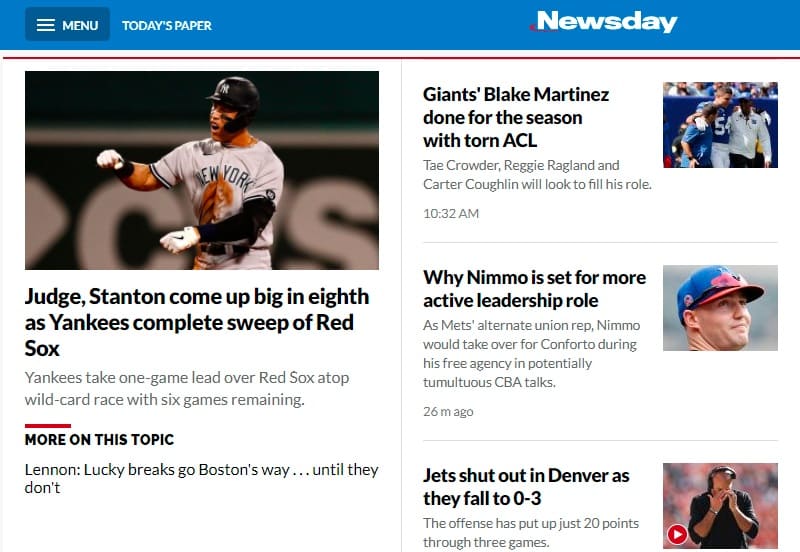Welcome to the latest edition of “ADA in the News,” featuring recent news, updates, and rulings regarding the Americans with Disabilities Act.
The U.S. District Court for the Eastern District of New York late last month issued a decision in an accessibility case that legal experts say could put the spotlight back on the question of whether Title III of the Americans with Disabilities Act (ADA) applies to websites.
 In Winegard v. Newsday LLC, a man claimed that he visited New York newspaper Newsday’s website to watch videos but was unable to view them because the videos lacked closed captioning. The complaint alleged that Newsday’s failure to provide closed captions violated the ADA.
In Winegard v. Newsday LLC, a man claimed that he visited New York newspaper Newsday’s website to watch videos but was unable to view them because the videos lacked closed captioning. The complaint alleged that Newsday’s failure to provide closed captions violated the ADA.
Contrary to other decisions regarding website accessibility claims, the Eastern District court concluded in this instance that the ADA language outlining “places of public accommodation” does not extend to websites of businesses with no public-facing, physical retail operations.
“Congress could easily have said ‘all businesses operating in interstate commerce,’ or referred to all ‘retail’ or ‘service’ operations…but it chose, instead, to focus on physical places,” Judge Eric Komitee wrote. “At a more specific level, if Congress had wanted to capture business operations rather than places, it would have said ‘accounting firm or law firm,’ rather than using the clunkier phrase ‘office of an accountant or lawyer.’ Apropos of this case, Congress could easily have included ‘newspapers.’ It did not. These choices demonstrate Congress’s decision to apply the ADA’s anti-discrimination provision to physical places rather than business operations generally.”
The court did acknowledge that Congress could not have anticipated the Internet when the ADA initially was passed, but noted that it could have amended the definition to clarify inclusion with the ADA’s 2008 amendment.
The court granted Newsday’s motion to dismiss, and held in this matter that for a website to have accessibility obligations under Title III, it must offer the same goods and services as the business’s brick and mortar operation.
Though the decision is not binding on other Southern and Eastern district judges – and may not be of much benefit to businesses with corresponding physical locations – it could present new defense avenues in accessibility claims.
“For now, businesses must continue to await an act of Congress or regulations from the Department of Justice for the definitive guidance that they have been asking for over the last several years,” writes Epstein Becker & Green lawyers Shira Blank and Joshua Stein. “In the meantime, the easiest way to avoid falling prey to a website accessibility lawsuit, including one regarding a failure to provide closed captioning, is to achieve substantial conformance with WCAG 2.1 Levels A and AA.”
Medical Linen Provider Settles Disability Discrimination Lawsuit
A medical laundry and linen services provider will pay $37,500 to settle a disability discrimination lawsuit filed by the U.S. Equal Employment Opportunity Commission (EEOC).
According to the EEOC’s lawsuit, an applicant, who has cerebral palsy and is deaf, was interviewed by Crothall Healthcare, Inc., for a laundry services worker position at the company’s Rome, Ga. location. The man came to the interview with an American Sign Language interpreter and mobility aids, and asked for a stool as an accommodation for his disability.
Crothall refused to extend an offer to the applicant and claimed the position had been filled. However, the company hired more than 80 non-disabled workers for the position shortly after the man applied, according to the EEOC’s complaint. This alleged conduct violates the ADA, which prohibits discrimination based on a disability.
Under the consent decree resolving the lawsuit, Crothall also will conduct regular reporting, monitoring, annual training, distribution of anti-discrimination policies, and notice posting.
Institute Settles ADA Complaint

Disability Rights Connecticut filed the complaint with the U.S. Attorney’s Office for the District of Connecticut on behalf of a woman who is deaf. The complaint alleged that the woman went to the Hartford Hospital Emergency Room and was then transferred to and treated by the medical staff at the Institute of Living. The Institute is a mental health center that specializes in comprehensive patient care, research, and education in the fields of behavioral, psychiatric, and addiction disorders.
On multiple occasions, the patient requested a sign language interpreter during her admission to understand treatment options, to attend group therapy sessions, and to understand and sign documents provided to her during her stay. She was not provided with a qualified interpreter and was not able to participate in group therapy sessions to treat her symptoms. The complainant also could not communicate with her treating psychiatrist and did not fully understand why she had been admitted into the hospital.
Title III of the ADA requires places of public accommodation, including hospital facilities, take steps to ensure that individuals with disabilities are not excluded, segregated, or otherwise treated differently due to the absence of auxiliary aids and services, such as qualified interpreters.
The settlement requires the Institute to provide appropriate auxiliary aids and services, including qualified interpreters, at all of its patient facilities to individuals who are deaf or hard of hearing, provide ADA training to all staff members, and compensate the complainant in the amount of $10,000.
Arizona Hospital Settles Over Lack of Sign Language Interpreter
A Flagstaff, AZ, hospital has agreed to pay $50,000 to a patient who accused the facility of discrimination for failing to provide a sign language interpreter.
The settlement stems from accusations that Flagstaff Regional Medical Center discriminated against an individual by not providing American Sign Language interpretation while he was a patient there.
The medical center paid an additional $2,500 fine to the Arizona Attorney General’s Office as part of a settlement, and agreed to update its policies and training procedures for accommodating patients who are deaf or hard of hearing.




